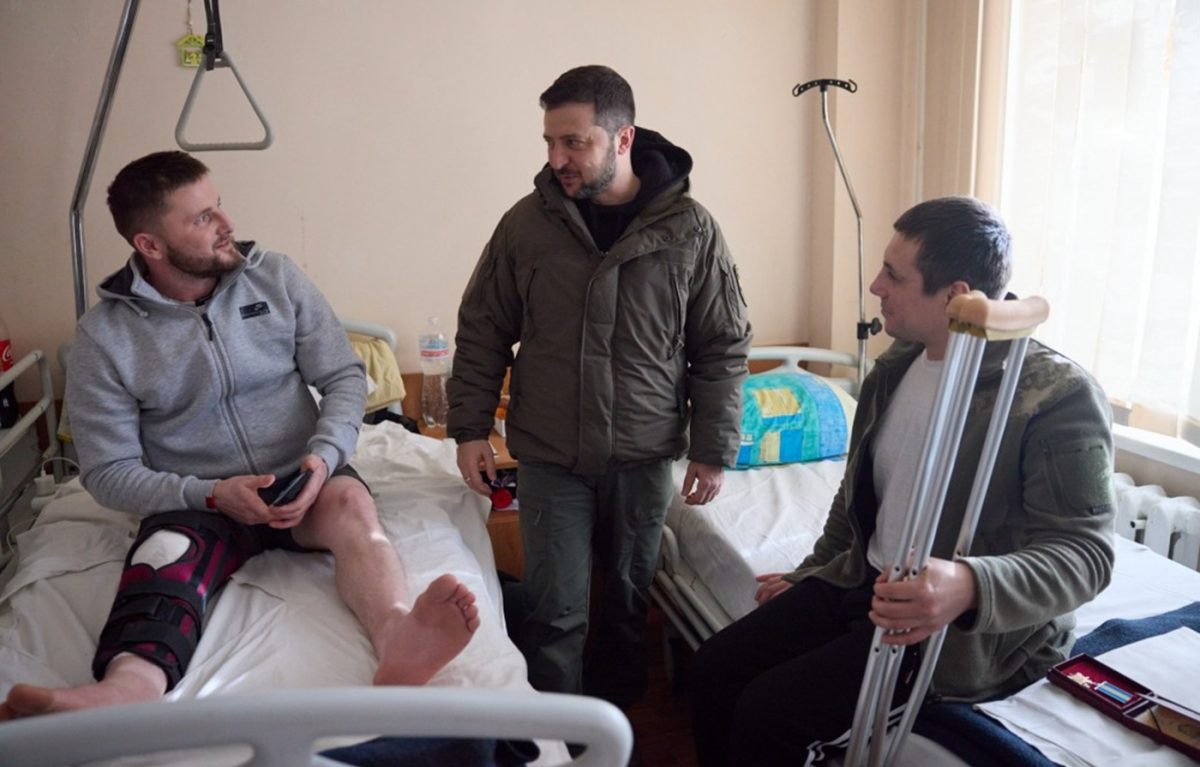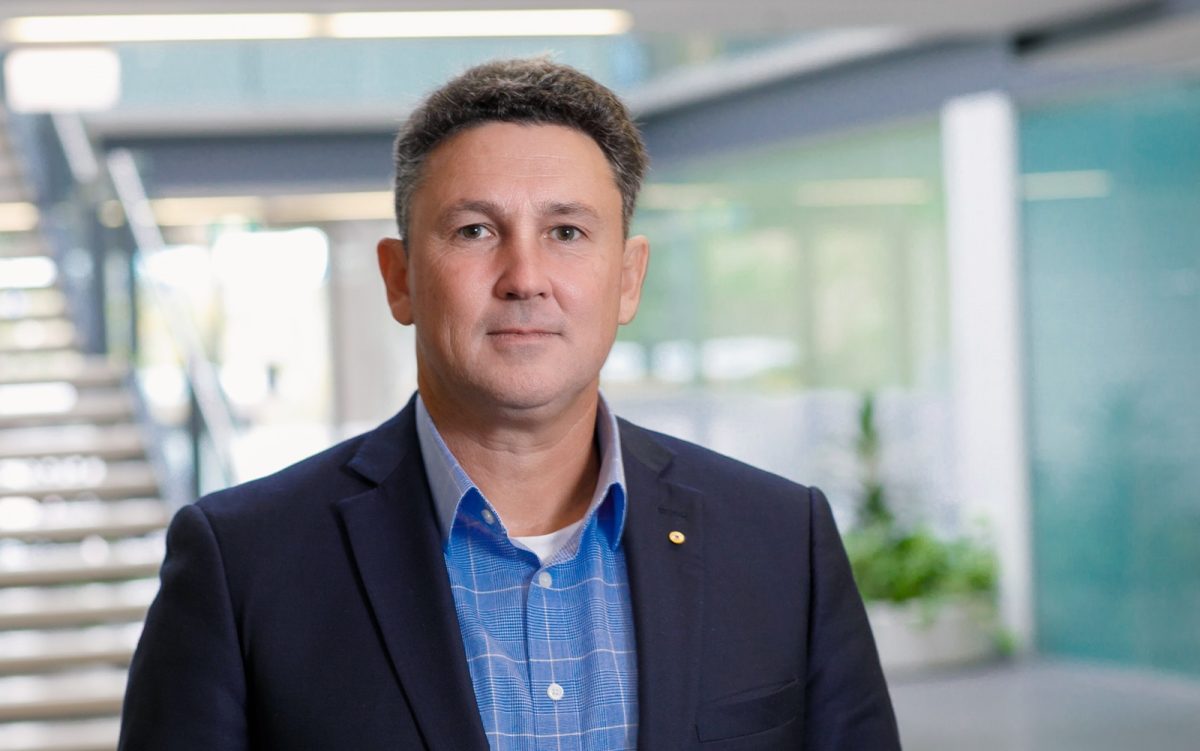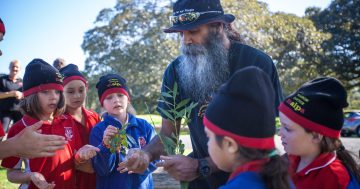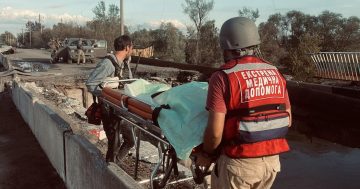
Ukraine President Zelensky visits wounded soldiers in hospital. The mission to train and assist Ukrainian trauma medical staff will last long after the war has ended. Photo: President Zelensky office.
The War in Ukraine has seen battles, casualties and combat trauma on a scale not seen for nearly 80 years.
Since Russia invaded in February 2022, large battles using modern Western and Russian military equipment and weapons have been fought, interspersed with periods of relative calm or stalemates or seemingly indiscriminate attacks on Ukrainian cities and infrastructure.
As part of its support for Ukraine, the US Government is conducting a study, hosting symposia and conducting training with Ukrainian trauma surgeons in an effort to provide joint learning activities on wartime casualty care.
The symposia and training are facilitated through the US non-profit Henry M Jackson Foundation for the Advancement of Military Medicine (HJF), with Canberra-based Aspen Medical through its US office brought in by HJF as a member of its team.
Aspen Medical’s Executive General Manager – International Operations Andrew Lowe said the premise behind the study is that this is the first time since World War II that the Western world has had exposure to and an understanding and insight into large-scale nation-on-nation conflict.
“We’re looking at what those lessons are and how they are different from the last 30 years of the Western experience,” he told Region.
“From our interest area, how you deliver health services, how you save lives, and how you evacuate people is significantly different.”
In the counterinsurgencies of the last 30 years – predominately in the Middle East – there was an overmatch between the warring parties’ capabilities and weaponry.
“But, in these large-scale intensive combat scenarios where you’ve got what they call ‘near-peer’ or ‘peer-on-peer’, it fundamentally changes the nature of the battlefield and how services are delivered across all areas, particularly health services,” Lowe said.
The study was devised by the US Defense Department to learn from the Ukraine war and to feed those lessons back to Ukraine, NATO and the US military.
“It started with key informant interviews,” Lowe said.
“We initially started trying to do them in Ukraine, but that became problematic. So, we brought them out of Ukraine to Warsaw.
“We then moved from not just doing interviews, but because you’ve got these subject-matter experts that are coming out, as well as these health professionals, particularly trauma surgeons from Ukraine, we used that opportunity to conduct symposia.”

Aspen Medical’s Executive General Manager – International Operations Andrew Lowe says Ukrainian combat trauma surgeons are the best at what they do because of their recent experiences. Photo: Aspen Medical.
The symposia covered different topics and involved professional trauma specialists from the US and around the world coming together to choose a different topic each month.
And because all of these professionals were in attendance, the study identified areas where the Ukrainian training could be ‘topped up’.
“Ukrainian surgeons are, unfortunately and tragically, the best at what they do given their experience and opportunities,” Lowe said.
“But when we got these groups together, we started conducting what’s called ASSET training – Advanced Surgical Skills and Exposure to Trauma courses. You’ve got cutting-edge medical professionals from around the world that can provide advice, and they can download ideas from each other.”
The symposia and the asset training contract have been extended to September 2025, but Aspen Medical forecasts medical training and support needs in Ukraine far beyond that.
“One of the key benefits that has come from these symposia is how we can support rehabilitation in Ukraine, and specifically, to supporting rehabilitation of amputees of which there are tens of thousands,” Lowe said.
“We have a partnership with an organisation called the First Medical Union, a consortium of seven health facilities from around the Lviv area in western Ukraine that run a rehabilitation program called the ‘Unbroken Program’, the largest rehabilitation program in Ukraine, and we support that through our not-for-profit arm, the Aspen Medical Foundation, with grants from the Alcoa Foundation.
“We’ve had grants allowing us to purchase componentry for prosthetics, but more importantly, to conduct training for more than 75 rehabilitation specialists so they can fit prosthetics and guide rehabilitation.”
Lowe said the scale and severity of casualties from the war hasn’t been seen for decades.
“They call it polytrauma,” he said.
“The type of weaponry being used has a far greater velocity, with more shrapnel and greater heat, so you’ve got burn injuries on top of multiple fragmentation, which is a different type of injury. Its whole intent is to be more lethal.”
The other problem Ukrainian trauma surgeons have is the length of time it can take for a combat trauma case to receive treatment.
In Vietnam, the US talked about the ‘golden hour’, meaning if a patient could be stabilised and seen by a trauma surgeon in about an hour, there was a much higher chance of survival.
But in Ukraine, a long front, stretched supply lines, and the targeting of medical services by drones means that hour can stretch to several hours or even days.
“It’s about stopping the bleeding and restoring vital functions until you can do the more technical work,” Lowe said.
Regardless of the outcome of the war, it’s going to be long and on a scale not seen in decades.
“If we look at it from just the health perspective – and it’s pretty clear the health sector is being targeted – it’s going to need not only reconstruction, but rehabilitation,” Lowe said.
“There’s the physical rehabilitation such as for amputees and prosthetics, but there’s also mental health.”















